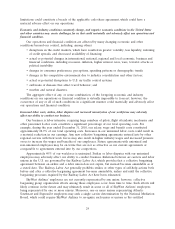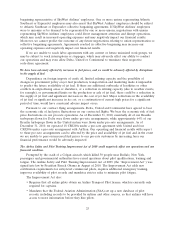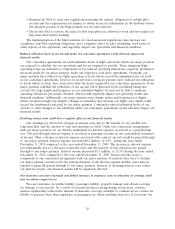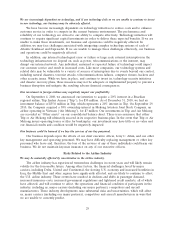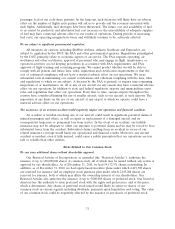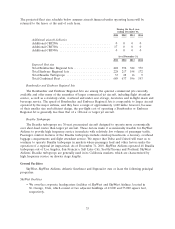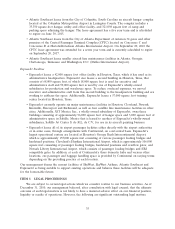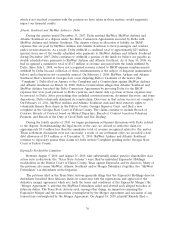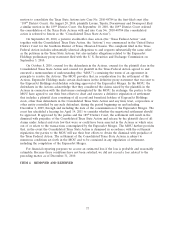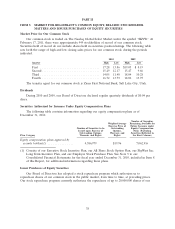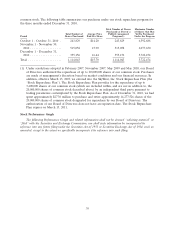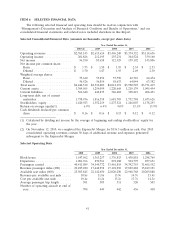SkyWest Airlines 2010 Annual Report Download - page 35
Download and view the complete annual report
Please find page 35 of the 2010 SkyWest Airlines annual report below. You can navigate through the pages in the report by either clicking on the pages listed below, or by using the keyword search tool below to find specific information within the annual report.passenger load of our code-share partners. In the long run, such decreases will likely have an adverse
effect on the number of flights such partner will ask us to provide and the revenues associated with
such flights. Additionally, fuel shortages have been threatened. The future cost and availability of fuel
to us cannot be predicted, and substantial fuel cost increases or the unavailability of adequate supplies
of fuel may have a material adverse effect on our results of operations. During periods of increasing
fuel costs, our operating margins have been, and will likely continue to be, adversely affected.
We are subject to significant governmental regulation.
All interstate air carriers, including SkyWest Airlines, Atlantic Southeast and ExpressJet, are
subject to regulation by the DOT, the FAA and other governmental agencies. Regulations promulgated
by the DOT primarily relate to economic aspects of air service. The FAA requires operating, air
worthiness and other certificates; approval of personnel who may engage in flight, maintenance or
operation activities; record keeping procedures in accordance with FAA requirements; and FAA
approval of flight training and retraining programs. We cannot predict whether we will be able to
comply with all present and future laws, rules, regulations and certification requirements or that the
cost of continued compliance will not have a material adverse effect on our operations. We incur
substantial costs in maintaining our current certifications and otherwise complying with the laws, rules
and regulations to which we are subject. A decision by the FAA to ground, or require time-consuming
inspections of or maintenance on, all or any of our aircraft for any reason may have a material adverse
effect on our operations. In addition to state and federal regulation, airports and municipalities enact
rules and regulations that affect our operations. From time to time, various airports throughout the
country have considered limiting the use of smaller aircraft, such as our aircraft, at such airports. The
imposition of any limits on the use of our aircraft at any airport at which we operate could have a
material adverse effect on our operations.
The occurrence of an aviation accident would negatively impact our operations and financial condition.
An accident or incident involving one of our aircraft could result in significant potential claims of
injured passengers and others, as well as repair or replacement of a damaged aircraft and its
consequential temporary or permanent loss from service. In the event of an accident, our liability
insurance may not be adequate to offset our exposure to potential claims and we may be forced to bear
substantial losses from the accident. Substantial claims resulting from an accident in excess of our
related insurance coverage would harm our operational and financial results. Moreover, any aircraft
accident or incident, even if fully insured, could cause a public perception that our operations are less
safe or reliable than other airlines.
Risks Related to Our Common Stock
We can issue additional shares without shareholder approval.
Our Restated Articles of Incorporation, as amended (the ‘‘Restated Articles’’), authorize the
issuance of up to 120,000,000 shares of common stock, all of which may be issued without any action or
approval by our shareholders. As of December 31, 2010, we had 54,172,971 shares outstanding. In
addition, as of December 31, 2010, we had equity-based incentive plans under which 4,419,708 shares
are reserved for issuance and an employee stock purchase plan under which 2,643,208 shares are
reserved for issuance, both of which may dilute the ownership interest of our shareholders. Our
Restated Articles also authorize the issuance of up to 5,000,000 shares of preferred stock. Our board of
directors has the authority to issue preferred stock with the rights and preferences, and at the price,
which it determines. Any shares of preferred stock issued would likely be senior to shares of our
common stock in various regards, including dividends, payments upon liquidation and voting. The value
of our common stock could be negatively affected by the issuance of any shares of preferred stock.
31





